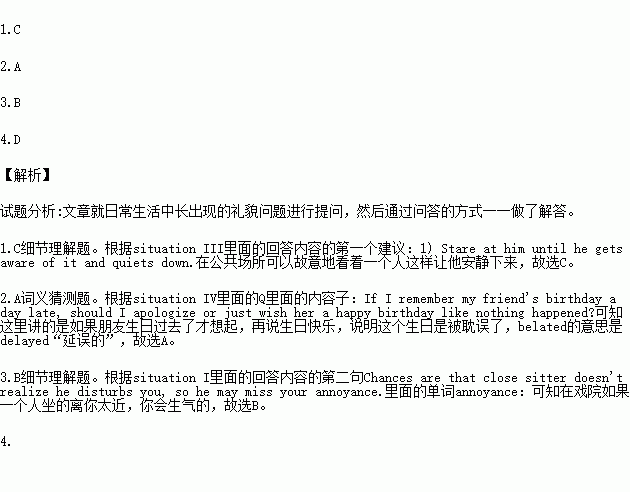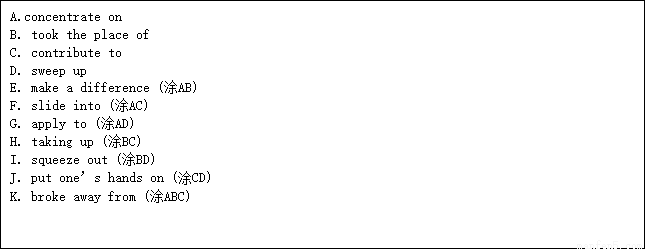题目内容
(Q = Question; A = Answer)
Situation I
Q: If someone sits right next to me in an empty movie theater, is it rude to move?
A: Maybe, but nobody will fault you for it. Chances are that the close sitter doesn’t realize he disturbs you, so he may miss your annoyance. You undoubtedly aren’t the first person he’s met who needs enough room. Forgive his bad judgment, move quietly and enjoy the show.
Situation II
Q: If I use the bathroom at a store, do I need to buy something?
A: Consider frequency and urgency. Is this a one-time thing or an emergency? If so, you don’t have to buy anything, but it would be kind if you did. However, if you regularly use the bathroom at this place, then you are a customer, and you should act like one.
Situation III
Q: If someone is talking loudly on the bus, is there a nice way to ask him to keep it down?
A: No. Try other means: 1) Stare at him until he gets aware of it and quiets down. 2) Lift your finger in a silence motion(动作) and smile. 3) Put on earphones and ignore him.
Situation IV
Q: If I remember my friend’s birthday a day late, should I apologize or just wish her a happy birthday like nothing happened?
A: This is the reason why the word belated was invented. “Happy belated birthday!” is short for: “Well, I know I forgot, but then I remembered. Forgive me and happy birthday.”
Situation V
Q: Can I lie about seeing a text because I was loo busy or lazy to respond to it?
A: Don’t lie. Receiving a text does not mean you need to respond(回复) to it. Why waste a perfectly good lie when the truth will serve? “Yes,” you can say if ever asked, “I saw it.” No explanation is needed as to why you don’t respond.
1.How will you quiet someone down in a public place?
A. By talking to him directly.
B. By pointing angrily at him.
C. By looking purposefully at him.
D. By making fun of him continuously.
2.The underlined word “belated” in Situation IV probably means ________.
A. delayed B. returned C. predicted D. regretted
3.You will get annoyed in a theater when ________.
A. a person is too rude to you
B. a person sits too close to you
C. a person is too active
D. a person talks too loudly
4.What is the passage mainly about?
A. Different ways to change others’ manners.
B. Good manners to talk to people.
C. Proper manners to offer help to others.
D. Modern ways to mind your manners.
 名校课堂系列答案
名校课堂系列答案

